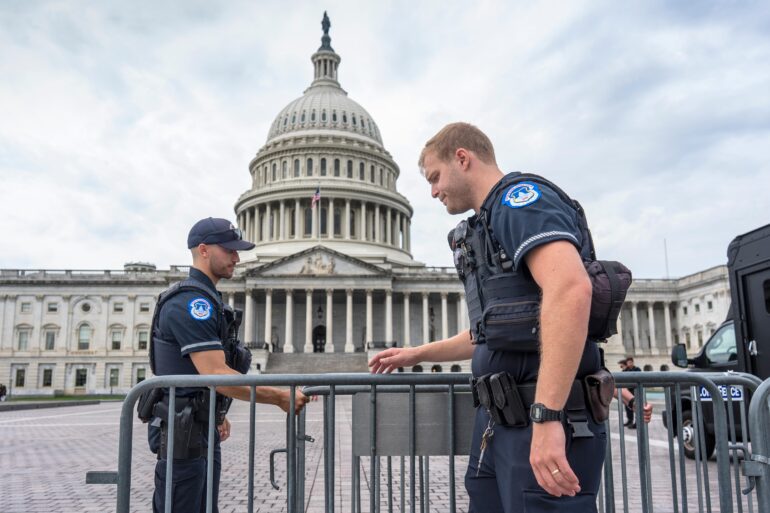As the clock ticks down to a potential federal government shutdown at midnight on September 30, 2025, the Trump administration has issued a stark directive: federal agencies must prepare for permanent mass layoffs, marking a sharp break from past practices. This move, outlined in a memo from the White House’s Office of Management and Budget (OMB), shifts the focus from temporary furloughs to reductions-in-force (RIFs) that could shrink the federal workforce for good. With Congress deadlocked over funding, both sides are digging in, canceling trips and trading blame in a high-stakes standoff.
A New Playbook for Shutdowns
In previous government shutdowns, non-essential federal employees have typically been furloughed—sent home without pay but with the expectation of returning once funding resumes. This time, however, the OMB memo, first reported by Politico and obtained by Fox News Digital, orders agencies to map out RIF plans for employees tied to programs facing a lapse in discretionary funding. “Programs that did not benefit from an infusion of mandatory appropriations will bear the brunt of a shutdown,” the memo states, urging agencies to issue layoff notices where no alternative funding exists.
The directive requires agencies to submit detailed RIF proposals to OMB, with revisions planned once fiscal year 2026 appropriations are finalized. The goal, according to the memo, is to retain only the “minimal number of employees necessary to carry out statutory functions.” Notably, critical services like Social Security, Medicare, veterans’ benefits, military operations, law enforcement, Immigration and Customs Enforcement, Customs and Border Protection, and air traffic control would remain unaffected.
This approach represents a significant escalation. Historically, agencies have developed their own contingency plans—outlining which workers stay on the job without pay—posted on OMB’s website ahead of deadlines. As of late Thursday, those plans for the current crisis had not yet been disclosed.
Blame Game Intensifies on Capitol Hill
The White House has squarely pinned the risk of a shutdown on Democrats, warning that their refusal to support a “clean” stopgap measure could force these drastic cuts. The House of Representatives passed a continuing resolution (CR) on September 19 to extend funding through November 21, but Senate Democrats blocked it in a 44-48 vote. In response, Democrats proposed their own bill, which included permanent extensions of Affordable Care Act subsidies—a provision absent from the GOP plan. That effort failed 47-45.
“We remain hopeful that Democrats in Congress will not trigger a shutdown and the steps outlined above will not be necessary,” the OMB memo concludes, emphasizing President Trump’s support for a straightforward funding bill. The administration reiterated that no layoffs would occur if Congress acts in time.
Democrats, however, are firing back. House Minority Leader Hakeem Jeffries, D-N.Y., took to X (formerly Twitter) on Wednesday to lambast OMB Director Russ Vought as a “malignant political hack.” “We will not be intimidated by your threat to engage in mass firings,” Jeffries wrote. “Get lost.” Senate Democrats have also faced internal pressure for their shifting stance on shutdown risks, with critics arguing their push for ACA protections is stalling bipartisan progress.
On Capitol Hill, the fallout is already visible. Garbage collection and public tours of the Capitol are set to be suspended if funding lapses, adding to the disruption. Meanwhile, President Trump canceled a planned meeting with Democratic leaders amid the funding feud, as noted by Fox News senior congressional correspondent Chad Pergram on “Fox & Friends.”
Congressional Trips Scrapped Amid Uncertainty
The shutdown threat is rippling beyond policy debates into lawmakers’ schedules. Several government-funded congressional delegations (CODELs)—official trips organized by committees—have been abruptly canceled, according to Axios reporting from senior Democratic and Republican sources.
Among the casualties: a House Science, Space, and Technology Committee visit to New Mexico’s Los Alamos and Sandia National Laboratories, and a trip arranged by the House Oversight Committee. Lawmakers and staff learned of the cancellations due to the “likelihood of a shutdown,” with non-refundable travel bookings cited as a key factor. One Oversight-bound lawmaker noted that a third trip was also axed for similar reasons.
“It’s one of the starkest indicators yet that lawmakers on Capitol Hill are hunkering down for a shutdown,” Axios reported. A senior House Democrat emphasized that “CODELs cannot happen without a legislative appropriation,” meaning any remaining trips would be grounded if funding expires. While not all delegations are affected—a House Republican slated for next week’s travel said they’ve heard nothing yet—the cancellations underscore the growing anxiety.
A Republican leadership source clarified that decisions are being made by individual members, not top brass, but the bottom line is clear: without a deal, all such travel grinds to a halt.
What’s at Stake?
With federal funding set to expire in just three days, the impasse threatens not only jobs but also everyday government services. The OMB’s RIF preparations signal a willingness to use the crisis as leverage for long-term workforce reductions, a tactic Democrats decry as political brinkmanship. As negotiations stall, the public watches warily—wondering if Congress can bridge the divide before the lights flicker out on non-essential operations.
The White House did not respond to requests for comment, but the message from OMB is unequivocal: pass the clean CR, or face the consequences. For now, the Capitol remains a pressure cooker, where canceled flights and fiery tweets are just the opening acts of a drama that could reshape federal employment for years to come.
